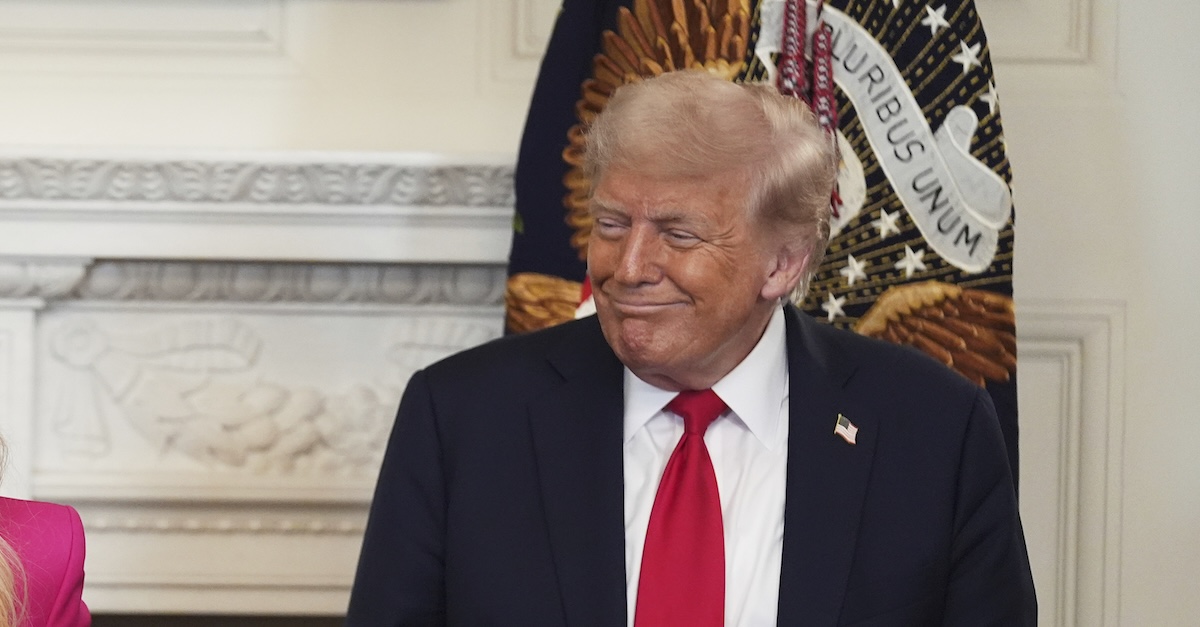
President Donald Trump at the White House Faith Office luncheon in the State Dining Room, Monday, July 14, 2025, in Washington (AP Photo/Evan Vucci).
A federal judge on Monday suggested the Trump administration is intentionally flouting legal obligations and sending immigrants to “face persecution, torture, or death” in their home countries.
In a 16-page memorandum opinion and order, U.S. District Judge Tanya Chutkan, a Barack Obama appointee, took the federal government to task for its “illegal” deportation methods as of late — while at the same time declining to rule in favor of the five deported West African men who filed their lawsuit a few days ago.
On Sept. 5, the plaintiffs were removed from Immigration and Customs Enforcement (ICE) detention, loaded onto a military cargo plane where they sat for nearly a day with several others, and then sent to Ghana — a country in West Africa which recently inked a third-country deportation deal with the Trump administration.
On Sept. 12, the five men, none of whom are Ghanaian, sued — alleging violations of the Convention Against Torture (CAT), constitutional due process rights, and the Administrative Procedure Act (APA).
Love true crime? Sign up for our newsletter, The Law&Crime Docket, to get the latest real-life crime stories delivered right to your inbox.
In the quickly-fashioned order, the court bristled at the behavior exhibited by immigration officials in the present case — and in others like it.
“Defendants” actions in this case appear to be taken in disregard of or despite its obligations to provide individuals present in the United States with due process and to treat even those who are subject to removal humanely,” the opinion reads. “These actions also appear to be part of a pattern and widespread effort to evade the government’s legal obligations by doing indirectly what it cannot do directly. These are not speculative concerns, and this case is not an outlier; it is not the first case in which plaintiffs allege that the government has deported or attempted to deport them with no notice or opportunity to contact family or counsel.”
The judge went on to briefly sketch out several instances in which the Trump administration violated court orders with deportations — including such high-profile cases as the Kilmar Abrego Garcia saga and the U.S. Supreme Court ruling which tightly restricted the government’s use of the Alien Enemies Act to conduct deportations.
Chutkan, however, bemoaned the facts on the ground as particularly prohibitive in the case of these particular plaintiffs — one of whom has already been removed from Ghana and four of whom are currently at the mercy of Ghanaian officials with a “final destination” of Nigeria or The Gambia.
Due to this state of affairs, if the foreign government in question is apparently calling the shots, the court says, “its hands are tied.”
Specifically, Chutkan determined the court does not have the jurisdiction to do what the plaintiffs are asking. While the judge said courts can issue orders to maintain jurisdiction where there is a “substantial jurisdictional question,” here, “there is no question.”
The plaintiffs, for their part, asked the court to order the Trump administration to instruct Ghanaian authority to keep them in Ghana or “to notify the Ghanaian government not to remove Plaintiffs to their countries of origin or other countries where they fear persecution or torture.”
Such requests, the judge determined, were essentially a matter of foreign affairs and thus “largely immune from judicial inquiry or interference.”
Chutkan also contrasted the facts with one of her earlier references to the documented perfidy and law-breaking of the Trump administration in the immigration realm.
“Here, unlike Abrego Garcia’s case, Defendants do not concede that Plaintiffs were improperly removed to Ghana—to the contrary, they argue that Plaintiffs were properly sent there pursuant to an agreement with Ghana, which agreed to take them,” the opinion continues.
Still, the judge said the record before the court looked something not entirely unlike an effort to violate the law – especially the CAT. And as to each plaintiff’s story, at least, Chutkan did not balk.
From the opinion, at length:
[A]fter an extensive immigration process, a U.S. immigration judge found that Plaintiffs had shown that they were more likely than not to face persecution, torture, or death if they were returned to their home countries. One Plaintiff, D.A., who is also married to a U.S. citizen, fled his country after being tortured by the military and police officers who told him that if they ever saw him again, they would kill him. The immigration court found that he, like the other Plaintiffs, was entitled to protection by the United States.
“This court cannot order the U.S. government to order a foreign government to take any action, despite facts in the record indicating that this agreement may have been designed to evade Defendants’ obligations to Plaintiffs,” the opinion goes on. “The court does not reach this conclusion lightly. It is aware of the dire consequences Plaintiffs face if they are repatriated. And it is alarmed and dismayed by the circumstances under which these removals are being carried out, especially in light of the government’s cavalier acceptance of Plaintiffs’ ultimate transfer to countries where they face torture and persecution.”

